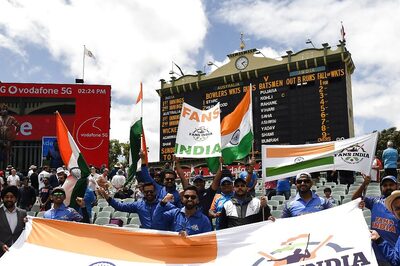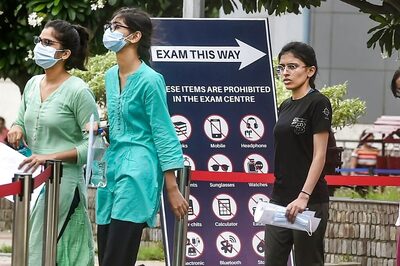
views
“Same sex relationships have been around for ages, people just kept it personal. I had also wanted to keep it that way, but I was forced to speak up because I was being blackmailed by my sister who threatened to expose me to the media if I didn’t end my relationship. But I am attracted to this woman and I want to live with her forever, which is why I have told the media and the public. What I am doing is not wrong nor is it a crime. I am doing it for my future, for myself.”
And just like that, in a quiet, matter-of-fact way, 23-year-old Olympian Dutee Chand became India’s first openly LGBTQ sportsperson. The announcement was shorn of histrionics or heroism. But there it was, India’s fastest woman had just become one of its most fearless.
“Society is made up by all of us. Why should we be scared of society? People will always say things. But everybody in the world is not the same. No two people have the same body or mind. People will say all kinds of things, positive or negative or both. If we pay heed to that, our life will be over. If we listen to what people have to say, we will be stuck.”
Perhaps it’s because she is just 23 that she has such clarity. She doesn’t seem weighed down by the bone-crushing, soul-diminishing baggage that older generations in the LGBTQ community have carried. Perhaps it’s because she’s made that long, long jump from being an impoverished child in the village of Chakagopalpur on Odisha’s east coast, which, by the way, is still picking up the pieces after Cyclone Fani, to being an elite Indian athlete.
Perhaps it’s because she’s used to challenging the status quo. In 2014, she was tested without being told. Her natural testosterone level was found to be higher than what the rules permitted female athletes. Neither medical treatment nor surgery, the only recourse for this condition of hyperandrogenism, was acceptable to her. Instead, Chand waged an over year-long battle in the Court of Arbitration for Sport against the International Associations for Athletics Federation. If going with the flow was not an option, rejecting what was natural was even less so.
“I understood that what was in my body was natural and no one can stop what is natural, so I decided will be exactly the way I am and play. Payoshni madam said we can fight a case against the rule.”
Despite the public humiliation and nerve-wracking anxiety about her future, Chand stuck it out to see her case set an international precedent. New rules framed in 2018 prescribed limits for women, running in races 400m and longer. Chand who competes in 100m and 200m, was free to do what she was born to - run.
“I was in sports to bring glory to the country by winning medals and to be fit. Why should I change my body or fitness? When I was having no trouble living or running, why should I have had a medical intervention? The rule was wrong. There are no rules for men but women have hyperandrogenism test, gender test, lots of tests. Conditions in all countries are not the same. Some are developed, some are poor. The human body is different, some tall, some short, some fat; if these differences are accepted then the hyperandrogenism rule, the hormone rule should not have been made.”
So that’s how Chand became the first Indian woman in 36 years to qualify for the 100m in the 2016 Rio Olympics. What is natural and doesn’t harm her or others, can’t be wrong, she reasoned. It’s the same reasoning she’s using today to share that she is in love with a younger woman from her village. What’s different though is where her family, friends and local community members were supportive the last time she took on the world, this time they aren’t on her side. At least not yet.
“In my view, I believe I have done the right thing. Human life is short, it’s not forever. If you hide something, you will have to hide it forever. If you reveal the truth, it can become history. So I have told the world. Initially, no one helped or supported me. I was criticised for doing something that’s against our cultural traditions. I was told this doesn’t happen in India. But actually, people do live like this in India, they just don’t reveal it. I have been cursed and abused, but as people get used to the idea, they understand that there’s nothing wrong or bad.”
The historic Supreme Court verdict in September last year that put an end to homosexuality being treated as a criminal offence has helped many openly acknowledge or confirm their sexual orientation. It definitely made it easier for Chand, who says she knows she can’t be thrown in jail anymore.
The ‘first-ever for Indian sports’ moment that Chand has claimed is big, but what’s bigger is the massive blow her disclosure has struck on India’s repressed and shrouded in secrecy sexuality. She talks candidly about how she discovered that she was attracted to women.
“I noticed I was attracted to girls when I was about 18. I wasn’t able to figure out then why I felt like that. I used to feel aroused when I was around girls and I felt like hugging and kissing them. I wasn’t sure why I used to feel that way. As I grew older and got more knowledge about my body, I understood what was happening. But I was scared and worried especially about the future and who I would find to settle down with or live with. I didn’t like it when guys proposed to me and I would feel my future with them wouldn’t be a good one. But then God heard me and thankfully sent me someone who liked me back.”
Chand’s candour is rare and to be cherished. As more women and men record their stories of coming out, they smash not just the taboo on homosexuality but also the long traditions of prudery and titillation that accompany any talk of sex. Chand’s coming out will help bring sex out of the closet in this country.
While privacy will still be valued, as it should be, people especially the young will find it easier to stop associating sex with shame, guilt, judgment, porn and that crippling question, log kya kahenge. Every detail that’s shared, every report that’s filed even when it is discussed pruriently, will be a step out from the shadows towards the light.
Chand has made it clear if it is about sex and love, it’s about the simple bare necessities linked to everyone’s inalienable right to be happy. She reminds us that society, that’s happy to pry, criticise and ostracise, is made up of the very individuals it loves to loathe.
As this young woman from Odisha strives to shave microseconds off her personal best of 11.24 seconds down to the 11.15 needed to qualify for the Tokyo Olympics, she has already qualified as an Indian icon.


















Comments
0 comment